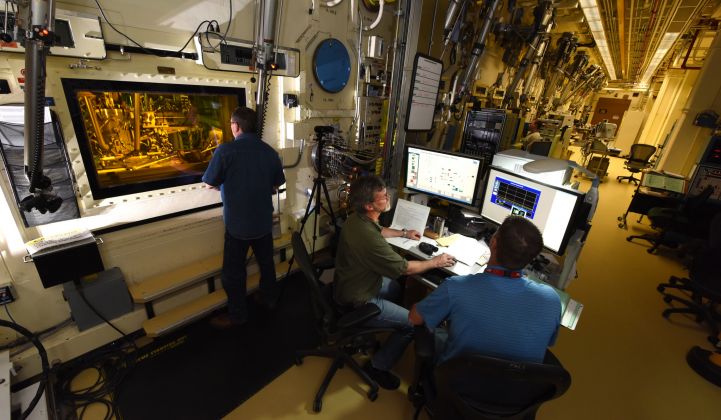The Trump administration has made shoring up existing nuclear power plants a key — and controversial — component of its energy agenda. But it's also looking ahead to the next generation of nuclear reactor technology.
On Friday, President Trump signed the Nuclear Energy Innovation Capabilities Act (NEICA), which passed earlier last month with bipartisan support. The bill is expected to speed up the development of advanced reactors in the U.S. by eliminating several of the financial and technological barriers standing in the way of nuclear innovation.
“There are some truly transformative advanced nuclear technologies being developed in America right now, and this bill just reinforces this administration’s continued efforts to revitalize the nuclear industry,” said Ed McGinnis, principal deputy assistant secretary for the Office of Nuclear Energy, in a statement.
NEICA was designed to foster collaboration between the public and private sectors, building on relationships formed under the Department of Energy's Gateway for Accelerated Innovation in Nuclear program. To help offset upfront costs, the bill calls for a cost-share grant program to cover a portion of the licensing fees charged by the U.S. Nuclear Regulatory Commission during its new technology review process.
It also directs the DOE to facilitate the siting of advanced reactor research demonstration facilities through partnerships with private industry.
On the technical side, the legislation requires DOE to develop a fast test reactor, or fast neutron source, used for testing advanced reactor fuels and materials. The U.S. doesn't currently have this capability.
In addition, DOE must expand its high-performance computing expertise by focusing on the modeling and simulation of advanced nuclear reactors. "The national labs, universities and private sector will help develop new software and tools for developers to use to speed up their research on fission and fusion reactors, in addition to space applications," according to the DOE announcement.
Nuclear power advocates pushed for several of these reforms in a recent policy paper. The nonprofit and nonpartisan Center for Climate and Energy Solutions published a blog post last week praising the passage of NEICA as a small but critical step in accelerating the rate of decarbonization.
"Advanced reactors can dependably generate zero-emission electricity and useful heat, and they are scalable to produce large quantities of energy from a very small footprint," wrote C2ES President Bob Perciasepe. "New designs hold the promise of being more affordable, even safer, and are expected to produce less waste than the current generation of reactors."
"To meet our climate and clean energy goals, we must seek stable solutions that endure political transitions and maintain an ambitious pace to reduce emissions — and NEICA is an encouraging sign that there are potential partners for cooperative action," he continued.
Energy Secretary Rick Perry now has 180 days to provide Congress with a report assessing the ability to host and operate experimental advanced nuclear reactors at the national labs or other DOE sites. He must also submit two 10-year budget plans for nuclear R&D.
The renewed focus on advanced nuclear technology builds on the Trump administration's support for traditional nuclear power plants. Last fall, Secretary Rick Perry introduced a plan to shore up power plants with 90 days of fuel on site — something only nuclear and coal plants can provide. But that proposal was ultimately rejected by the Federal Energy Regulatory Commission.
In June, the White House issued a new order for Secretary Perry to stem the loss of existing nuclear and coal power resources. A leaked memo revealed the administration is working on a new plan to offer guaranteed profits for nuclear and coal plants, leveraging emergency authorities.
The White House has remained mum on the power plant bailouts in recent weeks. But an announcement could come soon, ahead of a fiercely competitive midterm election.




